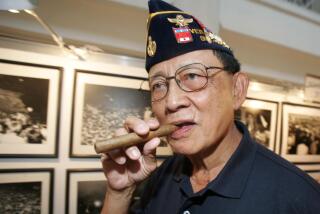Philippine President Seeks to End Airline Feud : Ownership: Ramos offers stock to highest bidder in fight for PAL, which has cast a pall over his privatization effort.
- Share via
MANILA — President Fidel Ramos, whose administration is enmeshed in an ugly corporate battle for control of Philippine Airlines, plans to break an ownership stalemate by putting the government’s key stake in the national carrier on the block to the highest bidder.
The struggle between two wealthy Philippine businessmen has threatened the future of the flagship airline and cast a shadow over the government’s program to privatize key industries.
Fighting for control are Antonio Cojuangco Jr., a telecommunications tycoon, and Lucio Tan, a tobacco grower who was a close business associate of former President Ferdinand Marcos. Their battle could also lead to a delay in payments to Boeing Co. for four 747 jetliners on order.
Analysts said Ramos’ announcement indicates a willingness by the government to allow market forces to settle a major issue rather than intervene directly in business decisions. Some had feared that the government might be sucked more deeply into the feud between Cojuangco and Tan.
Each of the men controls about 40% of PR Holdings, a consortium that holds the majority of stock in PAL. The government holds the remaining 20%, and control of that stake would tip the balance of power in the bitter boardroom fight.
“The shares inside PR Holdings which belong to the government . . . should now be disposed of to the highest bidder at a public auction,” Ramos said.
Government financial institutions will not be allowed to fund either party, he added. “No, that will be reversing our policy of privatization.”
After the government sold most of the carrier last year, it watched as its showcase project began to unravel amid revelations that Tan had secretly acquired a share in the consortium through Cojuangco. The two erstwhile allies had a falling-out this year.
Tan launched a campaign earlier this month to wrest control of the consortium from Cojuangco. He is reported to be trying to buy stock from minor shareholders in a bid to exert sole control over the company.
News reports in the past week that Tan has been secretly amassing PAL shares have raised fears that the carrier and perhaps other major Philippine industries may be slipping back under the control of a corrupt network of insiders--reminiscent of the Marcos era.
After Marcos was overthrown in a popular revolt in 1986, new President Corazon Aquino began a program to privatize major Philippine industries that were being run largely for the personal profit of Marcos associates.
Marcos was toppled after allegedly looting billions of dollars from the country. Tan’s emergence as a major PAL stockholder has confronted investors with unpleasant memories of institutionalized corruption during the Marcos regime and shaken the credibility of the government privatization scheme that was supposed to freeze out any of his former associates.
And Ramos’ decision to sell the shares is largely seen to benefit Tan, who is thought to have the deeper pockets of the two. Cojuangco has so far been unsuccessful in his attempts to raise the money to buy out Tan.
“Lucio Tan’s ascension to the throne might be seen as the government favoring a former crony of Marcos, and investors are quite against this,” said Joey Salceda, an analyst with Baring Securities.
Recent losses in the Manila stock exchange composite index have been attributed to fears that the public struggle for control of PAL will damage the investment climate in the country.
Ramos has publicly cautioned the principals against irresponsible behavior.
“The government will not allow any upheaval within PAL that will result in the downgrading of PAL as our flag carrier,” he said in a televised news conference in January. He said he will not tolerate a public struggle for control of the airline “that would negate the attractiveness of the Philippines as an investment, trade and tourism destination.”
The ownership fight has also cast doubt on the financing of major expansion plans at PAL.
Late last week, representatives of 18 Philippine banks met to re-evaluate the status of the second and last installment of a $122-million loan the banks agreed to extend the airline last year.
The officials, who spoke on condition of anonymity, said the $47-million installment, which was supposed to be extended by the end of January, is on hold until the corporate struggle is settled. The money was earmarked as a deposit on the four Boeing 747s. If the loan is delayed, the payment for the planes will also be delayed.
Finally, the struggle will not help the company’s first-ever Eurobond issue.
PAL, through Chemical Bank, is scheduled to begin a marketing roadshow for a $60- to $100-million issue next month.
More to Read
Sign up for Essential California
The most important California stories and recommendations in your inbox every morning.
You may occasionally receive promotional content from the Los Angeles Times.










